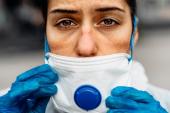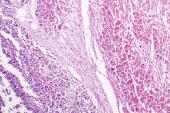COVID-19: TCTMD’s Dispatch for June Week 1
We’re curating a list of COVID-19 research and other useful content, and updating it regularly.

Since March 2020, TCTMD reporter Todd Neale has been writing up breaking news and peer-reviewed research related to COVID-19 every weekday. In July 2021, we transitioned to Mondays, Wednesdays, and Fridays. If you have something to share, tell us. All of our COVID-19 coverage can be found on our COVID-19 Hub.
June 2, 2022
 COVID-19 cases among Americans emerging from the Memorial Day holiday earlier this week were six times higher than this time last year, according to ABC News, noting that millions of Americans traveled for the long weekend at levels not seen since before the onset of the pandemic. That’s based on official case counts from the US Centers for Disease Control and Prevention (CDC), but real numbers are likely far higher, given the widespread availability of at-home testing.
COVID-19 cases among Americans emerging from the Memorial Day holiday earlier this week were six times higher than this time last year, according to ABC News, noting that millions of Americans traveled for the long weekend at levels not seen since before the onset of the pandemic. That’s based on official case counts from the US Centers for Disease Control and Prevention (CDC), but real numbers are likely far higher, given the widespread availability of at-home testing.
More broadly, COVID-19 cases are up 9% in the Americas, with pediatric cases doubling over the last 2 weeks in the US, even as global cases fell by 11% and deaths by 3%, CIDRAP News summarizes. A lack of transparency from North Korea, however, is making it difficult to factor in new cases there, which potentially number in the millions, according to frustrated World Health Organization (WHO) officials quoted in the story.
In South Africa, new COVID-19 infections have surged in recent months, despite studies suggesting that 98% of the population has antibodies from prior infection, vaccination, or both, the New York Times reports. A new study, “released Thursday but not yet peer-reviewed, analyzed the prevalence of two types of antibodies in 3,395 blood donors collected mid-March across the country in order to estimate prevalence at the national level,” the story explains. “About 11% had antibodies that, according to the study’s authors, suggest that a person had been vaccinated but not recently infected.”
Elsewhere on the continent, an analysis of 47 countries making up the WHO African region published in the Lancet Global Health estimates that the number of SARS-CoV-2 infections between January 2020 and December 2021 was more than 505 million, but infers that just 1.4% of infections (one out of 71) were reported. “Deaths are estimated at 439,500,” authors say, “with 35.3% (one in three) of these reported as COVID-19-related deaths.” Those numbers, they write, confirm other studies suggesting that the African region has had a similar number of COVID-19 infections compared with other parts of the world, but fewer deaths.
There’s more evidence that an mRNA booster can ratchet up the efficacy of Johnson & Johnson’s single-dose Janssen (Ad26.COV2.S) vaccine against the Omicron variant of COVID-19. Writing in a letter to the editor in the New England Journal of Medicine, authors calculated the vaccine effectiveness of four different homologous and heterologous vaccine doses, concluding that, regardless of original vaccine course, “all the regimens that included a booster dose, as compared with no vaccination, offered protection against symptomatic Omicron infection, although vaccine effectiveness was highest for the regimens that included a booster dose of an mRNA vaccine and was lowest for the homologous Ad26.COV2.S/Ad26.COV2.S regimen.”
Also in the NEJM, Israeli investigators tracked the immunity protection afforded by SARS-CoV-2 infection as compared with that conferred by vaccination, and how these wane with time. The upshot: people previously infected with SARS-CoV-2, regardless of whether they had received any dose of vaccine before or after infection, saw their protection against reinfection decrease with time, but the level of protection maintained over this interval appeared higher than that conferred by a second vaccine dose in someone who was previously uninfected. Notably, write the authors, “a single dose of vaccine after infection reinforced protection against reinfection.”
 The US National Institutes of Health-funded HEROS study has some intriguing new epidemiological insights, among them the observation that people with food allergies are less likely to catch COVID-19, and—as other studies have documented—that obesity and high body mass index are associated with a higher risk of SARS-CoV-2 infection. Asthma, however, did not increase risks. Additional observations are in the paper published this week in the Journal of Allergy and Clinical Immunology. One theory for the lower risk in people with food allergies, a press release notes, is that “type 2 inflammation, a characteristic of allergic conditions, may reduce levels of a protein called the ACE2 receptor on the surface of airway cells. SARS-CoV-2 uses this receptor to enter cells, so its scarcity could limit the virus’s ability to infect them.”
The US National Institutes of Health-funded HEROS study has some intriguing new epidemiological insights, among them the observation that people with food allergies are less likely to catch COVID-19, and—as other studies have documented—that obesity and high body mass index are associated with a higher risk of SARS-CoV-2 infection. Asthma, however, did not increase risks. Additional observations are in the paper published this week in the Journal of Allergy and Clinical Immunology. One theory for the lower risk in people with food allergies, a press release notes, is that “type 2 inflammation, a characteristic of allergic conditions, may reduce levels of a protein called the ACE2 receptor on the surface of airway cells. SARS-CoV-2 uses this receptor to enter cells, so its scarcity could limit the virus’s ability to infect them.”
COVID-19 has had “substantial global collateral CV damage” when it comes to the delivery of cardiovascular services around the world, particularly in low- and middle-income countries that were already lagging behind their higher-income counterparts, a systematic review and meta-analysis published this week in the European Heart Journal makes clear. Declines in services were seen across the globe, although countries outside of Europe and North America experienced steeper reductions in hospitalizations and primary PCIs for STEMI and worse short-term outcomes for certain conditions.
A review of all live births in Norway between September 2021 and February 2022, published in JAMA Internal Medicine, found that babies born to women who received a second or third dose of COVID-19 vaccine during the last two trimesters of pregnancy had a lower incidence of SARS-CoV-2 infection during their first months of life as compared with infants born to unvaccinated women. “The findings of this study provide early evidence to suggest that infants benefit from passive protection from SARS-CoV-2 infection following maternal COVID-19 vaccination during pregnancy,” the authors conclude, noting that similar protection has been documented with studies of pertussis and influenza vaccination during pregnancy.
 Patients hospitalized with COVID-19 have objective evidence of damage, including cardiovascular damage, to multiple organ systems up to 2 months after discharge, and these abnormalities have a relationship to long COVID symptoms, according to a prospective study published last week in Nature Medicine. As TCTMD’s Todd Neale reports, imaging, ECG, and biomarker tests performed 28 to 60 days after patients left the hospital revealed injuries to the heart, lung, and kidney that were typically not seen in contemporary controls without COVID-19. As senior author Colin Berry, MBChB, PhD, told TCTMD, the study lends support to the belief that “long COVID does have a pathological basis to it.”
Patients hospitalized with COVID-19 have objective evidence of damage, including cardiovascular damage, to multiple organ systems up to 2 months after discharge, and these abnormalities have a relationship to long COVID symptoms, according to a prospective study published last week in Nature Medicine. As TCTMD’s Todd Neale reports, imaging, ECG, and biomarker tests performed 28 to 60 days after patients left the hospital revealed injuries to the heart, lung, and kidney that were typically not seen in contemporary controls without COVID-19. As senior author Colin Berry, MBChB, PhD, told TCTMD, the study lends support to the belief that “long COVID does have a pathological basis to it.”
Todd Neale is the Associate News Editor for TCTMD and a Senior Medical Journalist. He got his start in journalism at …
Read Full Bio





Comments